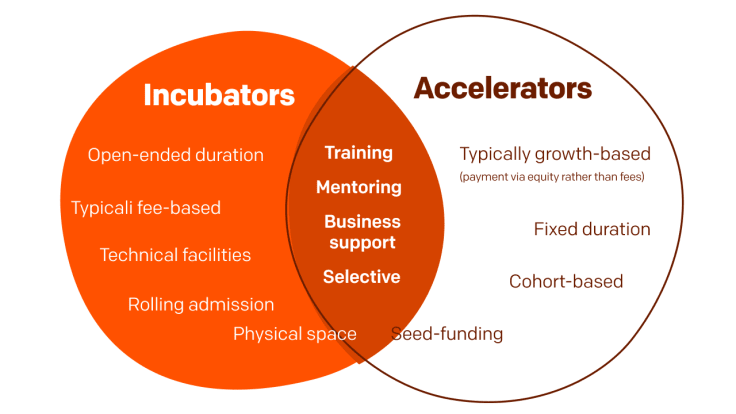Showing top 0 results 0 results found
Showing top 0 results 0 results found

You want to start a business. Your idea of what your product or service will do is crystal clear. You’re excited about telling the world about it and selling it to your target audience. Still, you lack a few essential factors: office space to work from, advice from more experienced business owners, or — most importantly — money to keep your business running.
Luckily, you don't have to figure it all out by yourself. Depending on how advanced your business is, you can apply to join a startup incubator or accelerator to fast-track your company's growth. Keep in mind that while both terms are often used interchangeably, they're very different and describe two different ideas.
Which one should you apply to, and what are the differences between business incubators and accelerators?
The idea of a startup incubator is older than you think
You might think that a business incubator is a relatively new concept but it actually dates back to 1959 when Joseph L. Mancuso opened the Batavia Industrial Center in a warehouse in Batavia, New York. Incubation got traction in the eighties and spread across the rest of the country and to the United Kingdom not long after. There are currently about 7,000 business incubators worldwide.
The challenges of starting a business these days are surely different compared to those sixty years ago, but the idea of a business incubator hasn’t changed that much. If you can’t come up with a clear vision for your Minimum Viable Product (MVP), you’re a solopreneur who needs support with building a team and growing your business, and you need a physical space to launch your business, joining a business incubator is the way to go.
Keep in mind that not all of them are open to any company to join them. Some programs don’t have an application process, and you’ll only be able to join one through a referral from a trusted partner.
What’s a startup incubator?
A startup incubator is a collaborative program typically run by nonprofit organizations. For the record — there are business incubators operated by for-profit companies. The main goal of those organizations is to help new companies at a very early stage grow and succeed. An incubator is usually physically located in one central workspace — like a co-working space — where a new business can work on its growth. One of the biggest advantages of working from a workspace like that is access to a network of other companies and entrepreneurs who were accepted into a program and faced similar challenges.
Being around fellow business owners, developers, designers, and marketers makes the whole experience a lot more relatable and supportive. Even when you start doubting yourself or your idea, you can always look up to other startups in your incubator who felt the same way at some point but overcame the difficulties and eventually started to grow. This brings us to mentorship, which is, by far, the biggest benefit of joining a startup incubator.
Startup incubators are geared towards companies and solopreneurs at a very early stage of running their businesses. They don't operate on a set schedule. You might join one for a couple of months, but you might as well stay in one for a couple of years. You don't need an MVP, but you'll need a business plan to join a startup incubator. Refining them is one of the goals of joining an incubator. You'll also work on the product-market fit and so on.
While you’ll find information claiming that incubators provide funds to grow your business, most of them won’t invest money in your startup. That’s because they’re usually nonprofit organizations associated with universities and business schools, and they raise money from corporate, government, investor sponsorships, etc.
There's more to incubators than providing physical space, mentorship, and nurturing your business. SCORE points out that some organizations also give you access to the crucial resources to running a business — office equipment, including computers, internet service, accounting, and legal services that can be discounted or even free.
What’s the difference between startup incubators and accelerators?
One of the fundamental differences is that you join the latter at a significantly later stage of running a business. While incubators provide professional help with turning early-stage business ideas into something more tangible, accelerators support businesses that already have some traction by speeding up their growth. As mentioned above, you don’t necessarily need an MVP when joining an incubator. With accelerators, it’s one of the minimum requirements that you need to meet.
The names of the two types of organizations in question are also very suggestive. While an incubator helps you "incubate" your idea that will hopefully become a sustainable business one day, accelerators "accelerate" the growth of an already existing company and focus on scaling a business. Companies accepted to accelerator programs get the support they need through education and mentorship, but they also get funding.
A company can join an incubator and stay in it for even a few years. An accelerator membership lasts for a fixed amount of time of intense and immersive education. In most cases, it's supposed to result in rapid growth caused by doing a few years of work in just a couple of months.
Susan Cohen of the University of Richmond and Yael Hochberg of Rice University distinguish four factors that make accelerators unique. They:
- Last from a few weeks to a few months (fixed-term)
- Help a cohort of companies at the same time (cohort-based)
- Are mentorship-driven
- Culminate in graduation or demonstrating their business to investors and media

It’s not easy to get into an incubator, but the application process to an accelerator is even more competitive. Y Combinator, one of the most well-known accelerator programs, only accepts about 2% of the applications it receives. Techstars, another successful accelerator program, usually accepts only 10 startups out of 1,000 applications.
The biggest difference between incubators and accelerators lies in financial investment. You already know that most incubators won't invest money into your business. It's the other way around when it comes to accelerators — companies admitted into a program usually get a seed investment in exchange for equity that an accelerator can cash in later if your business turns out to be a success.
Conner Forrest from TechRepublic summarized the difference between incubators and accelerators as: “If an accelerator is a greenhouse for young plants to get the optimal conditions to grow, an incubator matches quality seeds with the best soil for sprouting and growth.”
Do your research
Before you start the application process and spend a ton of time preparing the necessary documentation and a slide deck presenting your idea, you need to know that incubators differ from one another. Just because you found a local one doesn't mean it will be a good fit for your business. The support you can get will vary a lot depending on whether you apply to a for-profit or nonprofit organization, their infrastructure, mentorship network, and the workspace they can provide.
People think that incubators and accelerators are all aimed at tech startups. That's not always the case. If your business idea doesn't belong to the tech vertical, you still have options — you'll just need to spend a bit more time looking for a program that can benefit your business.
Keep in mind that certain programs only help specific types of businesses. Take a look at LiveChat Incubator. LiveChat’s vision is to build a world without communication barriers, and this ties in with a mission of helping people and businesses communicate better and fully express themselves. We want to help early-stage startups that share our views on communication by providing them with mentorship, distribution channels, office space, and technology.
“The LiveChat team is constantly thinking of new ways to improve the business communication industry,” said LiveChat CPO, Filip Jaskólski. “We look forward to supporting innovative teams with our experience and technology. With our help, these teams will be able to drive faster product development while focusing on the customer. We’re also eager to share our lessons learned, so they can steer out of entrepreneurial pitfalls.”
Coming back to the due diligence you should be doing before you apply — you can never go wrong by talking to other business owners who joined an incubator. Ask them at what stage they joined a program, how it helped them grow, what the results were, and if they'd join that incubator again if they could turn back time. On top of that, do a background check of an incubator, meaning how many companies became established businesses after they graduated from an incubator.
It’s time to fill out your application form
If you've been on the fence about applying to a startup incubator or accelerator, you should have a better understanding of which option is the right fit for you by now. Each business comes with its own set of challenges, and your choice will be a highly individual matter. Also, don't get discouraged if your first application is declined — competition is fierce, and only a tiny percentage of applicants get into a program. And if you feel like LiveChat's incubator might be worth a shot, talk to us. Who knows — maybe it's the catalyst that you're looking for.
Get a glimpse into the future of business communication with digital natives.
Get the FREE report








Comments